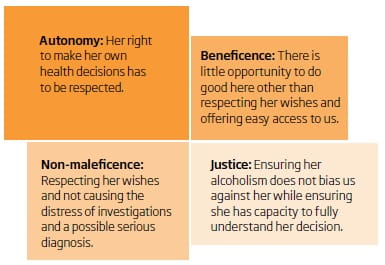4 Pillars of Medical Ethics
Medical ethics is an applied branch of ethics which analyzes the practice of clinical medicine and related scientific research. At a glance these principles appear simple and there are many examples of clearly unethical medical decisions.

Medical Ethics Ethical Dilemmas In Healthcare Education Projects Group
Although it looks clear enough that we are required to avoid inflicting harm on anyone at all again the problem arises when there is a conflict between meeting the best interests of our patient and doing no harm.

. Ad Browse discover thousands of brands. Free easy returns on millions of items. Such tenets may allow doctors care providers and.
Autonomy This is the most important pillar of medical ethics. The fundamental ethics in health care typically fall into the four broad categories of patient autonomy beneficence nonmaleficence and social justice. The four basic pillars of medical ethics are beneficence non-maleficence justice and autonomy.
Medical ethics is based on a set of values that professionals can refer to in the case of any confusion or conflict. Beneficence Non- maleficence Autonomy and Justice. These ideas are loosely defined in four key values known as the four pillars of medical ethics.
Consent is a difficult concept particularly when it comes to children and young people. 1 All treatment decisions should be considered in the context of all four pillars of medical ethics. The ethical principles that form the foundation of decision-making in medicine are referred to as the Four Pillars of Medical Ethics.
Medical ethics is an applied branch of ethics which analyzes the practice of clinical medicine and related scientific research. Using examples from our field of sexual health and HIV we. In todays Western societies it is assumed that all medical strategies treatment and treatment plans are guided by the Four Pillars of Medical Ethics developed over centuries of ever-changing medical practice since Hippocrates of Ur often considered the Father of Modern Medicine.
30 Day Money Back Guarantee. The Four Pillars These pillars are important when dealing with any ethical dilemma in Medicine. These are the four pillars the foundation of ethics in healthcare and medicine.
Address ethical violations incl. It gives patients who are competent enough the right to make. Ad English Spanish Versions Available.
When it comes to autonomy you should think about. When this principle is violated moral injury occurs. Ethics in Finance is Good.
Codes of ethics state admin. If you would like regular 1-ON-1 guidance to help you get into your first choice medical sc. But What are the Four Pillars of Medical Ethics.
Beneficence non-maleficence autonomy and justice. If a child can make a decision about their health their decision should be respected. This article will address each of these ideas in turn and elaborate on their meaning and consequences for the practice of.
Start studying Ethics in Policing Mid-Term. B Respect for the law. When it comes to answering medical ethics interview questions these are key concepts that may be very relevant and could be brought up to demonstrate your knowledge of the capacity under which doctors.
Principlism is an approach to biomedical ethics that uses these pillars to justify moral decisions. Read customer reviews find best sellers. Justice is a compound principle with four separate strands.
In essence the principles. These pillars presentation templates slides are multipurpose and can be incorporated to demonstrate tons of topics. Code Medical Practice Acts.
You should apply the four pillars of ethics to any dilemmas about consent. The four pillars form the principles of medical ethics that guide the moral decision making of doctors but can also be applied to general society. Ad Two-day CME course elevates practitioner ethics and safeguards the public.
We fully support patient choice but question the wisdom of walking away from guidelines based solely on patient preference. Applying the Four Pillars of Ethics in a Medical Ethics Interview. The first principle of Beneficence simply put means to do good to others.
Theyre also pretty much guaranteed to come up in your interview so get familiar with them. Mannan goes through the meaning of medical ethics and the four pillars of medical ethics - Autonomy Beneficence Non Maleficence and Justice. Such cases are known as ethical dilemmas.
Applying The Four Pillars of Ethics to Consent. The four principles approach to medical ethics is hugely popular among prospective and actual medical students and doctors. Autonomy Justice Beneficence Non-Maleficence.
Photo by JC Gellidon on Unsplash. In no particular order they are Autonomy Beneficence Non-maleficence and Justice. Yet ethical dilemmas are common within medicine and there is not always an agreed-upon right decision.
Observe these key principles as inspiration when contemplating and observing ethical scenarios. Free shipping on qualified orders. The four pillars of medical ethics stem from a school of thought known as principlism.
The four pillars of medical ethics underpin the moral compass under which medical professionals must work. Today were looking at the 4 pillars of medical ethics framework. Patients have a moral right to determine their own goals of medical care that is they have autonomy.
These values include the respect for autonomy non-maleficence beneficence and justice. It has the benefit of apparent simplicity.

The Medic Portal Wondering What The Four Pillars Of Medical Ethics Are Find Out Here Http Ow Ly Tyh130gfdyp Facebook

Medical Ethics Interview Questions The Four Pillars Explained


Comments
Post a Comment